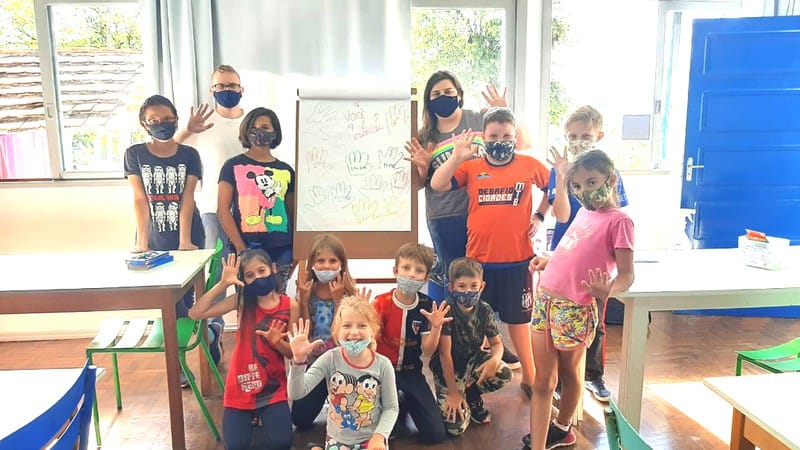
by Sabra_TXT | Dec 17, 2021 | news
IBC wishes you a Merry Christmas and a Happy New Year. We are really thankful for this last year. Thank you so much to all our donors, members and volunteers. We look back on a year full of break throughs, healings, learning a lot of new things, conduct new projects, growth from our Self Help groups and working with new volunteers. Thank you all for being part of IBC and changing the lives of many!
We wish you a time of rest and peace during this Christmas season. Enjoy this time with your families and friends. May you experience healing and renewed strength as we look into the future and start 2022.
Merry Christmas and a Happy New Year!
IBC

by Sabra_TXT | Oct 8, 2021 | news
October 7, 2021– International Blue Cross (IBC) is happy to announce that Reinhard Jahn has been elected president at its General Assembly on 07 October, which -due to the pandemic- took place in an online format.
Reinhard Jahn, CEO of the Blue Cross Germany, has extensive professional experience in the field of addiction and due to his position in the Blue Cross Germany possesses vast leadership- and management skills. He has been an active member in the IBC Network Committee since 2008. His involvement in Blue Cross´ international work has allowed him to become familiar with structures and processes within the federation- and development work of International Blue Cross.
Ever since committed to the cause of Blue Cross, Reinhard Jahn wishes to further enhance the cooperation between the German Blue Cross and promote networking and mutual learning between all Blue Cross member organisations and the international Secretariat of IBC. In his inaugural speech the newly appointed president affirms: “IBC is an invitation for all of us to stay connected and share experiences, doubts and ask and answer questions together. It is also an invitation to addicts and families in the Blue Cross countries to seek help and realize that they are not alone in their battle against alcohol harm and addiction. I would like to serve IBC in a faith-based and holistic way and continue and even enhance the engagement of Blue Cross Germany with IBC. I am motivated to bring the international work of IBC forward, help finding and knitting relations and partnerships worldwide and enhance the profile of Blue Cross as a global movement with one voice.”
In addition to its new president, IBC is pleased to announce the election of Hans Eglin, Managing Director of regional Blue Cross Youth organisation from Switzerland as vice president of the Network Committee (board).
Other newly elected Network Committee members are: Ewa Duda, addiction therapist and promotion coordinator at Blue Cross Poland and Lars Thidemann Jensen, Vice Secretary-General in Blue Cross Denmark.
Other Network Committee members continuing their terms are Rolf Hartmann, President of Blue Cross Brazil; Ingalill Söderberg, journalist and board member at local and regional Swedish Blue Ribbon; Holger Lux, MD, Director Blue Cross Rehabilitation-Centres in Romania. Substitute members are Patrick Acheampong, General Secretary Blue Cross Ghana, Revocatus Nginila, Project Coordinator, Blue Cross Society of Tanzania.

by Sabra_TXT | Jul 2, 2021 | news
We all know that the children of today are the future of tomorrow. How we educate them, how we see and treat them and how we act around them, is going to shape the world of tomorrow. But not every child has the privilege to grow up in a healthy environment. In Southern Brazil alcohol abuse is a significant issue for a lot of parents. Children of alcoholics suffer from the consequences of being brought up upon alcohol. Facing social exclusion, developing mental illness or even becoming alcoholics themselves is a real threat to their future. The KIDS Support Groups in Brazil committed themselves to tackle this problem. KIDS Support Groups are a place where children, affected by their parents’ substance abuse are welcomed and get orientation as a strategy of prevention and assistance to people in circumstances of social vulnerability and hazard.
The pandemic has challenged the work of the KIDS Support Groups a lot, since it wasn’t possible anymore to regularly meet each other and organise events. Nevertheless the facilitators of the KIDS Support Groups came up with new and creative ways to still support the kids in the communities of Brazil. All 36 KIDS Support Groups found different ways to individually support children during this difficult time. Some groups managed to organise online meetings, others even had some face-to-face activities.
Besides connecting with the kids, it is really important to educate new facilitators and build new partnerships in order to start more KIDS Support Groups all over Brazil. We are really excited to announce new partnerships in the north east of Brazil, where now a new group has been started!
Another achievement of the last couple of months was the finalization of the first story of the comic, “the Azulinho series”. In 2020 they started the elaboration of comics for prevention. These comics are used during activities and get distributed to kids. Working with comics is a way to prevent kids from drug and alcohol use in a child-friendly way.
If you want to know more about the KIDS Support Groups, you can read our reports on GlobalGiving: https://www.globalgiving.org/projects/kids-support-groups-in-brazil/

by Sabra_TXT | May 5, 2021 | news
International Blue Cross (IBC) has mandated the Swiss company RANAS to evaluate its projects in Chad and Congo as an expert advisor on human behavior change. This external evaluation assessed the life skills and peer education projects in Chad and Congo between 2017 and 2020 and reviewed the projects’ relevance, effectiveness, efficiency, impact and sustainability. By conducting desk review, key informant interviews, focus group discussions and interviews with beneficiaries, evaluators were able to clearly determine that IBC’s work in Chad and Congo has a strong impact on substance abuse and related behaviours (sexual risk behaviours and GBV), the related knowledge and attitudes. The impact of IBC’s local work goes beyond the effect on beneficiaries, influencing communal, structural, and governmental levels by changing people’s perception about substance abuse and even encouraging legal changes.The evaluation underlined that the projects are highly relevant in both countriesand positively impacted the targeted groups. It also recommended that IBC’s work should be extended to more areas worldwide where populations are suffering from substance abuse and related negative behaviours. Furthermore, the implemented projects were deemed sustainable and likely to maintain effects for a reasonable amount of time, as the behaviours are changed, leading to life-long improvements in the lives of beneficiaries, their families and communities. IBC is honored to have a positive impact which actively contributes to the achievement of the United Nation’s Sustainable Development Goals, in addition to contribution to a more peaceful, just, and inclusive societies.

by Sabra_TXT | Jul 15, 2020 | news
In the Republic of Congo, where we run our Life Skills programme, a peer-to-peer prevention programme has proven successful in sensitizing youth for appropriate behaviour to limit the spread of the virus. Youth participants of the “Generation 5S” (5S: sans drogue, sans alcohol, sans violence, sans VIH/SIDA, sans discrimination) use leaflets to sensitize their peers for correct behaviour. In a second step they encourage them to pass on the information to others, distributing leaflets to them and triggering a snowball-system.

by Sabra_TXT | Mar 23, 2020 | news
A lot has happened in the past days. In most places around the world governments and local authorities are implementing policies of social isolation to protect people from the fast spread of the Coronavirus. All of us need to adapt now to the new circumstances and confront the challenges of the pandemic COVID-19.
The most important to us is to protecting the vulnerable from disease – and this more so now! In all IBC programmes the local safety measures are being implemented. Activities within our Life Skills programmes in Togo, Chad and the Republic of Congo are continuing to being implemented according to the respective country´s situation and strictly in accordance with the advises of the World Health Organisation on Covid19. Blue Cross organisations around the world are rolling up their sleeves to be creative and to find the best way to be at the service of their clients and partners.
The International Blue Cross team- and board members currently work flexibly from home, the office of the IBC Secretariat in Bern is only sporadically occupied. Hence you might not reach us via our office phone number. So, please write us an e-mail indicating how we can reach you and we are happy to get back to you.
A further consequence we drew from the actual situation is the postponement of the IBC General Assembly. Instead of October 2020, it will take place one year later, from 4 to 8 October in South Africa. We are hopeful that by then this global health emergency had been solved without causing too high numbers of casualties.
And let us all dare to think that this pandemic not only means isolation, disruption and suffering – it also is a chance to reflect on ourselves, our role in this world and lead us to new shores discovering how we can best learn, work and live together in the future.
We wish you and your loved ones that you safely go through these hard times.
In solidarity,
Your Team of International Blue Cross






